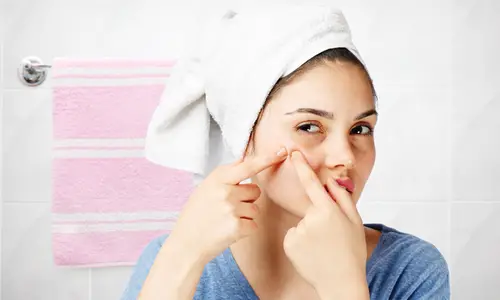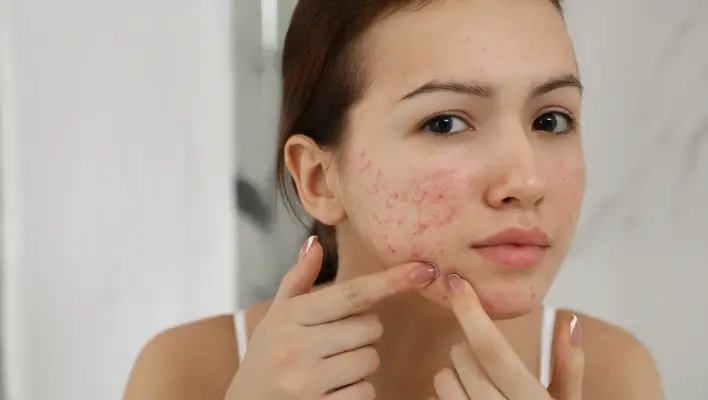Acne is one of the most common skin problems that people of all ages suffer from. Though there are many products available in the market that claim to be effective in treating acne, most of them contain harsh chemicals that can damage your skin in the long run. If you’re looking for natural skin care for pimples, you’ve come to the right place .There are a few key ingredients that can be used to reduce your acne problem and improve your skin’s overall health. If you are looking for a natural and safe way to treat your pimples, then read on this skin care tips of expert opinion.

What are Pimples?
Pimples are small, raised bumps on the skin that are usually red or white. They are caused by the buildup of oil and dead skin cells. They are a common symptom of acne, and there are different types.
Fast facts on pimples
Here are some key facts about pimples. More detail is in the main content.
– Pimples are small, red bumps that form on the skin.
– They are caused by the overproduction of oil and the build-up of dead skin cells.
– Pimples can occur on the face, neck, chest, back, or shoulders.
– There are several types of pimples, including blackheads, whiteheads, papules, pustules, and cysts.
– Pimples are not contagious, but they can be uncomfortable and embarrassing.
– There are many treatments available for pimples, including over-the-counter and prescription medications.
Types Of Pimples
Pimples come in many different shapes and sizes. Some are small and barely noticeable, while others are large and painful. Here are some of the most common types of pimples:
Blackheads: Blackheads are small, dark-colored bumps that form when your pores become clogged with oil and dead skin cells. They’re called “blackheads” because the surface of the bump is black.
Whiteheads: Whiteheads are small, white bumps that form when your pores become clogged with oil and dead skin cells. They’re called “whiteheads” because the surface of the bump is white.
Cysts: Cysts are large, painful bumps that form deep under your skin. They’re often filled with pus and can cause scarring.
Papules: Papules are small, red bumps that form when your pores become irritated or inflamed.
Pustules: Pustules are small, red bumps that are filled with pus. They’re similar to papules, but tend to be more painful.
Nodules: Nodules are large, hard bumps that form deep under your skin. They’re often painful and can cause scarring.
What causes pimples?
There are many causes of pimples on the skin, but the most common cause is clogged pores. When the pores become clogged with sebum, bacteria can grow and cause inflammation. Other causes of pimples include hormones, certain medications, and stress.
10 Home Remedies for Pimples
Different home remedies for pimples that you can try for Natural Skin Care For Pimples. Some of these remedies might work better for you than others.

1. Tea Oil
Tea tree oil is a staple in many medicine cabinets, and it’s also a great home remedy for pimples. The antimicrobial properties of tea tree oil make it a great natural alternative to benzoyl peroxide. You can apply tea tree oil to your pimples by dabbing it onto the affected area with a cotton swab, but it’s important to make sure you dilute it properly first.
- Pros: The oil is rich in antioxidants and has anti-inflammatory properties. These properties make tea oil an effective treatment for pimples.
- Cons: If you have pimples that are open or have popped, tea oil can cause further irritation.
2. Pure Honey
Honey has been used as a natural remedy for acne since ancient times. It contains antioxidants and antibacterial properties. But not all honey is created equal. Manuka honey, produced by bees in New Zealand, has the highest concentration of methylglyoxal, the ingredient responsible for honey’s antibacterial properties. If you’re using honey for pimple prevention, try adding it to skin care products or even preparing homemade face masks.
- Pros: It is antibacterial and easy to make.
- Cons: not enough research to back up the claims
3. Willow Bark
It is another natural ingredient to consider. Willow Bark contains salicylic acid, which helps dry out inflamed acne lesions. It also helps unclog pores. And as a natural exfoliant, willow bark can reduce future breakouts. And since willow bark also contains chamomile extract, it can soothe inflammation and reduce oxidative stress. That’s what willow bark extract does for your skin.
- Pros: This compound can help reduce inflammation and pain. It also has antimicrobial properties, which may help reduce the size of pimples and prevent them from spreading.
- Cons: There is limited scientific evidence to support these claims. Some people may also experience side effects such as dryness, redness, and irritation.
4. Clays
Applying a clay mask to face is another effective ingredient for acne and pimple prevention. Clays are excellent at drawing out excess oil and sebum from the skin, while willow bark has antibacterial properties and helps prevent the appearance of whiteheads and blackheads. It also helps with regulating your skin’s pH level, which is a crucial component for acne treatment. There are other natural remedies for pimples, but there are a few key ingredients that can be helpful.
- Pros: On the plus side, clay can absorb excess oil and help to unclog pores.
- Cons: On the downside, clay masks can sometimes be drying and may not be suitable for everyone. If you have sensitive skin, you may want to avoid using clay masks or use them sparingly.
5. Medications
Medications can zap pimples and stop new breakouts, but they can have side effects. Therefore, some people opt for more natural remedies. While natural skincare for pimples is not clinically proven, it can be useful in mild cases. However, if you’re suffering from more serious acne, you should seek medical treatment. The following tips can help you treat your pimples and get rid of the scars.
- Pros: medications used to treat acne are topical treatments, oral antibiotics, and oral isotretinoin.
- Cons: The main downside of oral isotretinoin is that it can cause serious side effects such as birth defects, liver damage, and mental health problems
6. Cucumbers
Cucumbers are also great for your skin. Their cooling and hydrating properties can reduce the inflammation and swelling of pimples. However, you should be careful not to apply a large amount of elements.
- Pros: Hydrating and can help to keep the skin moist, which is important for keeping pimples at bay
7. Turmeric Spice
Turmeric is a spice that contains curcumin, a compound with antioxidant and anti-inflammatory properties. It can be mixed with honey and applied to the skin or consumed in a cup of tea.
- Pros: It also has antibacterial properties that can help to kill the bacteria that cause pimples. Turmeric has anti-inflammatory properties that can help to reduce the redness and swelling of pimples.
8. ACV
Apple cider vinegar directly to the pimple because it can irritate your skin. Apply a mixture of one tablespoon of apple cider vinegar with two tablespoons of water to your face. Allow the mask to sit on your skin for five to 20 minutes before rinsing off. Repeat this process as often as necessary.
- Pros: it can help kill bacteria, reduce inflammation, and unclog pores
- Cons: Apple cider vinegar is acidic, so it may irritate the skin.
9. Abrasive cleansers
Using soaps and abrasive cleansers to remove dirt and oil from the skin is a mistake. Not only will these products strip your skin of essential oil, but they will also cause your pores to become clogged with too much sebum, worsening your acne. In addition to that, harsh soaps and skin scrubs strip your skin of natural oils, which can lead to irritation and redness.
- Pros: Help to exfoliate the skin and remove the dead skin cells that can clog pores and lead to breakouts
- Cons: they can sometimes irritate the skin, causing burning, stinging, and redness. If you have sensitive skin, you may want to avoid using an abrasive cleanser.
10. Green Tea
Green tea has numerous health benefits, including antibacterial and anti-inflammatory properties. This tea helps fight acne by reducing inflammation, which is one of the main causes of pimples. Although further research is necessary, a 2016 study of 80 women showed that green tea reduced acne on their faces. Another common acne treatment is applying raw honey, which fights redness and inflammation. This natural skin care can drastically reduce the number of pimples on your face for good.
- Pros: contains antioxidants, which can help to protect the skin from damage.
How can I prevent pimples?
A Few things you can do to help prevent pimples from forming on your skin:
-Wash your face twice daily with a mild cleanser.
-Avoid touching your face with your hands.
-Keep your hair clean and off your face.
-Exfoliate your skin once a week to remove dead skin cells.
-Avoid using oily or greasy cosmetics.
-If you have a pimple, do not pick at it.
What are some treatments for pimples?
If you have a pimple, there are a few things you can do by natural skin care to treat pimples:
-Wash the area with a mild cleanser.
-Apply a spot treatment to the area.
-Use a warm compress to help reduce swelling.
-Do not pick at the pimple.
Frequently Asked Questions
Can ice remove pimples?
Acne happens when the pores on your face and neck get clogged with oil and dead skin cells. Once these pores become clogged, they can swell up, and form pimples. Applying ice to the pimples can help to temporarily reduce the size and redness.
Is heat or cold better for pimples?
Some people may find that heat helps to reduce the appearance of pimples, while others may find that cold is more effective. Ultimately, it is important to experiment with different methods to see what works best for you.
How long do pimples last
Pimples typically last for a few days to a week.


3 thoughts on “Natural Skin Care For Pimples: Home Remedies for Pimples”
Comments are closed.